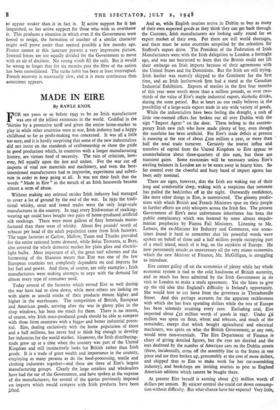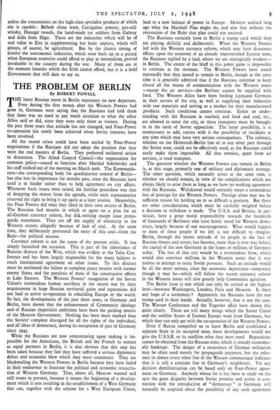MADE IN EIRE
By RAWLE KNOX
FOR ten years or so before 1945 to be an Irish manufacturer was one of the jolliest existences in the world. Coddled in the 'thirties by a protective tariff and given the entire home-market to play in while other countries were at war, Irish industry had a happy childhood so far as profit-making was concerned. It was all a little too easy, and it is hardly surprising that some of the new industrialists did not insist on the standards of craftsmanship or show the pride in good production which, in countries with a longer manufacturing history, are virtues bred of necessity. The rain of criticism, how- ever, fell equally upon the just and unjust. For the war cut off imports of vital raw materials and machinery, and even the best- intentioned manufacturers had to improvise, experiment and substi- tute in order to keep going at all. It was not their fault that the wards "Made in Eire " in the mouth of an Irish housewife became almost a term of abuse.
Without making any colossal strides Irish industry had managed to cover a lot of ground by the end of the war. In 193o the tradi- tional whisky, stout and tweed trades were the only large-scale manufactures in the country. In 1945 every Irishwoman of stocking- wearing age could have bought two pairs of home-produced artificial silk stockings. There were more gallons of fizzy lemonade manu- factured than there were of whisky. About five pounds' worth of tobacco per head of the adult population came from Irish factories. The sugar factories at Carlow, Mallow, Tuam and Thurles provided for the entire rationed home demand, while Solus Teoranta, at Bray, also covered the whole domestic market for plain glass and electric- light bulbs. Most important of all, the great turf schemes and the harnessing of the Shannon meant that Eire was one of the few European countries not completely dependent on coal imports for her fuel and power. And these, of course, are only examples ; Irish manufacturers were making attempts to cope with the demand for almost every type of consumer need.
Today several of the factories which served Eire so well during the war have had to close down, while most others are looking on with alarm as unsold stocks of their products mount higher and higher in the warehouses. The competition of British, European and American goods, arriving after the war in glossy piles in the shop windows, has been too much for them. There is no reason, of course, why Irish mass-produced goods should be able to compete with those from countries with a bigger and better industrial poten- tial. Eire, dealing exclusively with the home population of three and a half millions, has never had to think big enough to develop her industries for the world market. Moreover, the Irish distributing- trade grew up at a time when the country was part of the United Kingdom and still instinctively looks for British rather than Irish goods. It is a trade of great wealth and importance in the country, employing as many persons as do the food-processing, textile and clothing industries together—and these are three of Eire's largest manufacturing groups. Clearly the large retailers and wholesalers have had the ear of the Government, and have spoken at the expense of the manufacturers, for several of the quotas previously imposed on imports which would compete with Irish products have been „lifted. And so, while English tourists arrive in Dublin to buy as many of their own exported goods as they think they can get back through the Customs, Irish manufacturers are looking sadly round for an export market of their own. For there are still world shortages, and there must be some countries unspoiled by the relentless Sir Stafford's export drive. The President of the Federation of Irish Manufacturers went with the Irish delegation to London a fortnight ago, and was not heartened to learn that the British could not lift their embargo on Irish imports because of their agreements with the United States and the Dominions. But the Irish are still trying. Irish leather was recently shipped to the Continent for the first time, and an Irish leatherwork firm had a stand at the Canadian Industrial Exhibition. Exports of textiles in the first four months of this year were worth more than a million pounds, or over two- thirds of the value of Eire's staple industrial export, alcoholic drinks, during the same period. But at heart no one really believes in the possibility of a large-scale export trade in any wide variety of goods.
While the industrialists have been feeling the draught, a rash of little one-roomed offices has broken out all over Dublin with the sign "Import Agent" on the door. These belong to the contem- porary Irish new rich who have made plenty of hay, even though the sunshine has been artificial. For Eire's trade deficit at present is running at the rate of about £roo million a year, or more than half the total trade turnover. Certainly the tourist influx and transfers of capital from the United Kingdom to Eire appear to counterbalance about three-quarters of this sum, but these are transient gains. Some economies will be necessary unless Eire's sterling balances in London are to be eaten away in hearty bites. So far control over the cheerful and busy band of import agents has been only nominal.
There are signs, however, that the Irish are waking out of their long and comfortable sleep, waking with a suspicion that someone has pulled the bedclothes off in the night. Outwardly confidence, like most other things in Eire, is unrestricted. The gloomy predic- tions with which British and French Ministers spur on their people to further efforts are only whispers across the Irish Sea. The present Government of Eire's most unfortunate inheritance has been the public complacency which was fostered by some almost megalo- maniac prophecies by Fianna Fail Ministers. Listening to Mr. Lemass, the ex-Minister for Industry and Commerce, one some- times found it hard to remember that his powerful words were spoken on behalf of three and a half million people occupying part of a small island, much of it bog, on the outskirts of Europe. He now persistently attacks as unnecessary all the very minor economies which the new Minister of Finance, Mr. McGilligan, is struggling to introduce.
Eire cannot gallop off on the economics of plenty while her whole economic system is tied to the cold headstone of British austerity, and so much has been admitted by the Irish Government in its visit to London to make a trade agreement. Yet she hates to give up the old idea that England's difficulty is Ireland's opportunity.
She would love to cut loose from the governess in Threadneedle Street. And this perhaps accounts for the apparent recklessness with which she has been spending dollars while the rest of Europe has been solemnly counting every cent. Excluding coal, Eire imported about £22 million worth of goods in 1947. Under £6 million was spent on flour, wheat and tobacco, and much of the remainder, except that which bought agricultural and electrical machinery, was spent on what the British Government, at any rate, would term non-essentials. The Eire Department of Finance is chary of giving detailed figures, but the eyes are dazzled and the ears deafened by the number of American cars on the Dublin streets (these, incidentally, come off the assembly line in the States in one piece and are then broken up, presumably at the cost of more dollars, and shipped thus to Eire to make work for her car-assembling industry), and bookshops are inviting tourists to post to England American editions which cannot be bought there.
At present Eire herself is earning about £71 million worth of dollars per annum. By stricter control she could cut down consump- tion without difficulty. But what chance have her exports? Very little, unless she concentrates on the high-class specialist products of which she is capable: BeHeck china ware, Carrigaline pottery, pot-still whisky, Donegal tweeds, the hand-made toy soldiers from Galway and dolls from Sligo. These are the industries which will be of real value to Eire in supplementing her basic exports, which will always, of course, be agricultural. But by the chance timing of history the uneconomic industries, which were built up in a period when European countries could afford to play at nationalism, proved invaluable to the country during the war. Many of them are at the moment luxuries which the Irish, cannot afford, but it is a bold Government that will dare to say so.







































 Previous page
Previous page